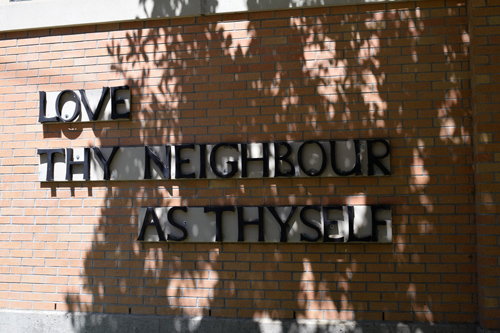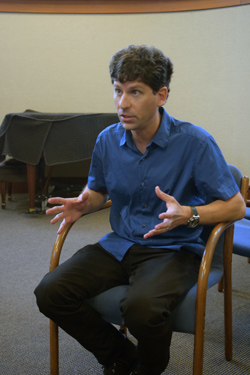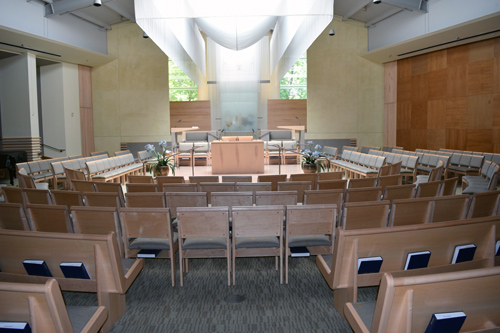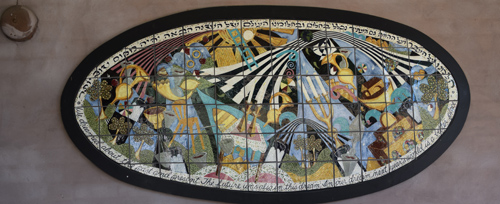
Editor’s Note: Editor Donald H. Harrison and his grandson Shor recently completed a 2,000 mile journey through California and Nevada, collecting and photographing Jewish stories along the way. This article is the third in a series generated during that trip.
Story by Donald H. Harrison; Photos by Shor M. Masori



SACRAMENTO — Congregation B’nai Israel, which traces its origins to California’s Gold Rush days, has been preparing itself to serve as a sanctuary congregation, hoping that by doing so it can popularize the moral belief that, as the Torah teaches, we must welcome the stranger.
The congregation’s immediate past president, Alan Steinberg, said considerable research went into the decision made in February to offer B’nai Israel’s premises to an undocumented person or family who meet certain criteria, among which is the possibility of a legal remedy against deportation still pending in the courts.
Steinberg, who now sits ex officio on the Reform temple’s board and heads the committee in charge of sanctuary arrangements, made it clear in an interview that while the congregation is willing to provide hospitality to undocumented persons, it will not interfere physically with the execution of a legal warrant by immigration authorities.
The hope is that federal authorities will be discouraged from forcibly removing a person from a religious institution whose membership is determined to publicize the righteousness of their cause. While no one will attempt to stop federal officers from carrying out their duty, Steinberg said it is highly likely that plenty of video cameras would be on hand to record the arrest.
To date, no undocumented person has applied for sanctuary, but the congregation—following an overwhelming vote of its membership and a unanimous vote of its board of directors—stands ready to extend hospitality as soon as it is needed.
The congregation not only has classrooms and a multipurpose area that can be converted to a family’s use, but also has on-premise shower stalls, which many other churches and synagogues cannot offer. Thus a network of other religious institutions belonging to Sacramento Area Congregations Together (ACT) have offered volunteer and financial support to B’nai Israel – should it be needed – in lieu of their hosting undocumented workers themselves.
Congregation B’nai Israel has close ties to the Sacramento city government. Mayor Darrell Steinberg – a former president pro tempore of the state Senate – is a member and husband of the congregation’s cantor Julie Steinberg. They are not relatives of Alan Steinberg.
The congregation’s spiritual leader, who was instrumental in persuading the congregation to adopt this course, is Rabbi Mona Alfi, a former chaplain to the state Senate. Another congregant, Jay Schenirer, serves on the Sacramento City Council.

As far back as the 1980s, the city of Sacramento decided it would serve as a sanctuary city, and only recently that declaration was reaffirmed by the City Council, according to Alan Steinberg. He said that the city’s police have been instructed not to participate in immigration raids. However, Sacramento’s county sheriff takes a different approach, regularly welcoming immigration officers to inspect the rolls of prisoners in the county jail.
Steinberg said the idea to become a sanctuary synagogue developed over the last two years, starting when a Jewish couple from Turkey—Zlata and Ayhan Durak–fled their country and after gaining legal admittance to the United States, needed a place to stay. “So we invited them in and provided them with some financial support and spiritual support here in our congregation. They stayed here for about six months, and now their paperwork has gone through and he has a job in the South Bay area, near San Jose.”
The congregation also offered its premises to homeless people during the winter, housing them for a week, serving them meals from the congregation’s kitchen, and having members engage and entertain them during their stay. Part of the program was to get the homeless guests in touch with employment services.
That experience led to B’nai Israel being designated as an overflow center for the homeless should the need arise.
With that background of extending help to others, according to Steinberg, the congregation began to focus on the debate over immigrants during the 2016 presidential election. “We wondered what would happen with immigrants, refugees, and predominantly Mexicans who might be here in this country illegally. So we had discussions about that and then after (Donald) Trump was elected, we had further discussions about whether if he followed through on some of his campaign promises about deporting people, how we could be of assistance to those people.

“In December, the board authorized the president and the rabbi — me and Rabbi Alfi — to call an immediate congregational meeting and have an email vote whether we wanted to discuss what we could do to help undocumented persons in our community. In January, the travel ban was announced, and then in February we called a congregational meeting. We had about 150 congregants come to the meeting and others provide email updates to us … The congregational meeting was overwhelmingly in support of it.”
Before making a decision, however, Alfi and Steinberg, who works as an attorney for CalTrans, inquired about the legal and public relations ramifications of bcoming a sanctuary. They wanted to know whether such a course would hurt the synagogue’s nonprofit status, whether the synagogue or its congregants could incur any liability, and whether the move might alienate some congregants or other members of the community. Congregants could not forget that in 1999 Congregation B’nai Israel had been firebombed by anti-Semites.
Rabbi Alfi “stressed the fact that throughout the Torah it speaks about accommodating the stranger, treating the stranger fairly, providing the stranger with support, and also making the stranger subject to the same laws that you are subject to, both those that are beneficial and not so beneficial,” Steinberg said. “You bring them in and provide them the protections that are available in your country and legal system.
“Also,” Steinberg continued, “we are all offsprings of people who came to this country looking for sanctuary from whatever situations they were in. Rabbi Alfi’s family was from Iran. … Her father’s side was from Iran, her mother’s side was Ashkenazi. Her father’s family escaped Iran to come to this country. Many people are offsprings of people who escaped the Holocaust. We have some Holocaust survivors in the congregation.”
Among those who exercised leadership on this issue in the congregation was Bernard Marks, a concentration camp survivor who watched members of his own family being dragged off by authorities, and saw a parallel in undocumented members of families in the United States being deported.
Said Steinberg: “Just declaring ourselves to be a sanctuary synagogue makes it known to our community and abroad that we think that this is an important issue to protect undocumented persons and not to have them forcibly removed from this country. We certainly don’t want families broken up!”
*
Harrison is editor and Masori is a staff photographer for San Diego Jewish World. They may be contacted respectively via donald.harrison@sdjewishworld.com and shor.masori@sdjewishworld.com